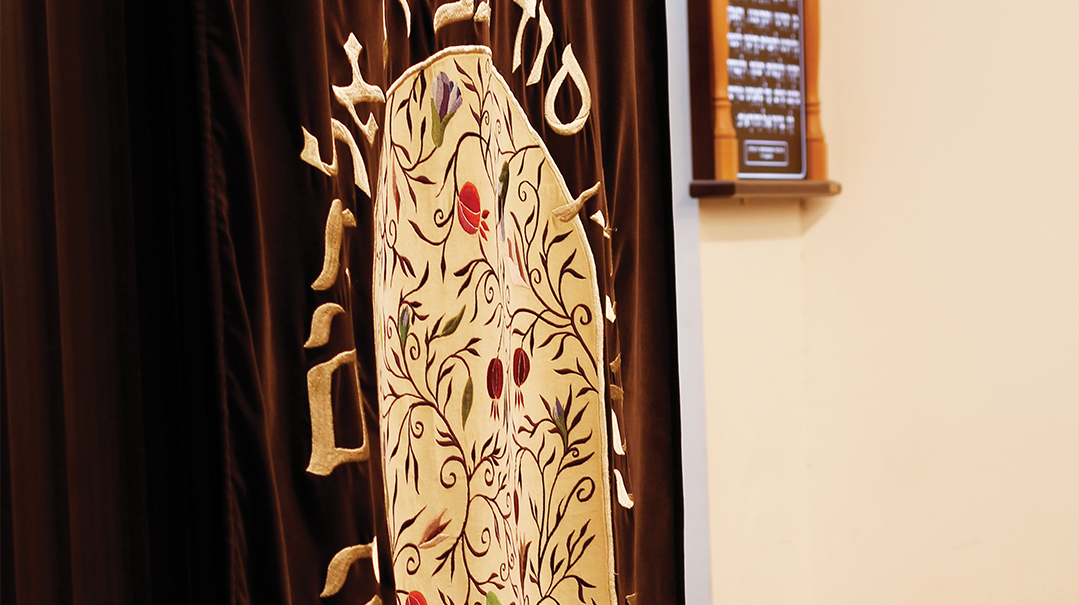What’s Mine and Yours is Hers
| April 21, 2015If he sees that you are upset about the loss to your husband’s learning, he’ll reconsider

His mission was her mission.
Rav Tzvi Kushelevsky, a towering talmid chacham, held many prestigious positions spreading Torah across Europe and Israel — each one requiring yet another move to a new place. And his loyal rebbetzin, Sarah Leah (Toki) Kushelevsky, gladly trekked to each new locale along with him. If he was where he was needed, that was her place too, and she was happy to be there.
The self-sacrifice of the Rebbetzin for her husband and his Torah was such that when her husband’s yeshivah Heichal HaTorah needed funds to complete its building, she sold the apartment they owned in Har Nof to finance it and moved into a rental apartment. For the Rebbetzin, a home for the yeshivah came before her own home.
It’s no surprise, then, that the yeshivah became her home and its students, her children.
Strong Roots
Middos and yiras Shamayim were as much part of the Rebbetzin’s essence as her astute intelligence — all trademarks of her distinguished lineage. As her sister-in-law and cousin Rebbetzin Sarah Gurwicz puts it, “She inherited these from her parents and grandparents — they were part of her upbringing.”
When Rav Elyah Lopian’s eldest daughter, Chana Liba, came of age, he left London and went back to his Lithuanian birthplace to find her a chassan. In the Mir, he found what he was seeking — young Leib Kushelevsky (who subsequently changed his name to Gurwicz, his mother’s maiden name, to enable him to leave Lithuania without legal problems).
The famed mashgiach of Mir, Rav Yerucham Levovitz, suggested that Leib ask the Chofetz Chaim whether he should pursue a shidduch from England — a place at that time devoid of Torah — even if he had the intention of returning to live in Mir. The Chofetz Chaim’s cryptic reply was, “Baruch Podeh u’Matzil [Blessed is the One Who redeems and saves].” Young Leib asked Rav Yerucham Levovitz for an explanation, and he told the young man that the Chofetz Chaim had intended him to leave. The prophetic reply became clear when Rav Leib was saved from the inferno that soon engulfed Lithuanian Jewry.
With the shidduch in place, Rav Elyah returned to London. But during the engagement period, his own rebbetzin, Sarah Leah Lopian, suddenly passed away at age 49, leaving 13 orphans. Chana Liba wrote to her chassan, explaining that she was unable to go through with the plan to move to Mir — she was needed at home to raise the children. As to the shidduch, she left it to Rav Leib to decide as he wished.
Rav Leib heeded the advice of the Chofetz Chaim and joined his kallah in England. The young couple moved into Rav Elyah’s home. Chana Liba ran the house, and they raised the family of orphans together. Their own family was born into this home, with its walls soaked with Torah and mussar and nourished by their parents’ extraordinary middos and devotion to Chana Liba’s siblings.
Two sons were born to the Gurwiczes, and then, in 1937, a daughter. She was given her grandmother’s name, Sarah Leah, but because she was raised in that grandmother’s household, no one used it. Instead, she was affectionately called “Tochterel” (Yiddish for little daughter), which her brother shortened into “Toki.” The nickname stuck, and while some outsiders called her Sarah, within the family she was Toki all her life.
In 1941, Rav Leib Lopian, the son of Rav Elyah, was requested to head the yeshivah in . A new era for Gateshead Yeshivah began, and the names Lopian and Gurwicz resound in the town’s narrow streets until today.
Rebbetzin Sarah Gurwicz — wife of Gateshead rosh yeshivah Rav Avrohom Gurwicz, Rav Leib Gurwicz’s son and successor, and daughter of Rav Leib Lopian ztz”l — remembers the time fondly.
“Gateshead was such a small town then,” she says. “The families numbered in the tens, not in the hundreds. There wasn’t much social life for the girls, so we were close. We used to have great fun together, even though Toki was a few years older. There was no Jewish girls’ school, so we went to the local school, and after that we had to attend ‘cheder.’ Mr. Avrohom Dov Kohn z”l, the principal of Gateshead Seminary, sent students from the sem to teach us — no easy task, since we had already finished school and the cheder was our social life. We loved getting to know the sem girls too, since our own circle was so small.”
The girls’ Jewish education was rounded off in the famous Gateshead Sem — smaller and more intimate back then. Mrs. Rosita Roberts was a close friend of Toki’s from sem days. “She was very, very clever,” Mrs. Roberts shares. “When we studied together, I had to ask her to slow down. The Gurwicz home was just wonderful — warm, lovely, and I remember her mother was a great cook. We felt so welcome and comfortable there. Toki’s father, of course, was very busy. We didn’t see him much because he was always in the yeshivah.”
Holding a Sefer Torah Close
Toki’s engagement to the brilliant scholar Rav Tzvi Kushelevsky — her first cousin — took place in Eretz Yisrael. From the first day of her marriage, Toki showed her commitment to her husband’s Torah. “She needed nothing for herself” is how the family describes it. Her comfort, her social life, even where she lived, was of no importance to the Rebbetzin — only her husband’s learning mattered. He’s a masmid to whom Torah is life itself; and she was the enabler, the essence of an eishes chayil who gave all of her considerable energy and personality so her husband could accomplish his spiritual goals. Mainly, she did everything in her power to ensure that not a moment of his time would be wasted.
There was nothing she wouldn’t do for him, and the Rosh Yeshivah’s devotion in return, and their perfect partnership, taught thousands of talmidim the beauty of shalom bayis and the full potential of a couple to truly become one unit. The Rosh Yeshivah would state that his Olam Haba was all hers too.
Wherever Rav Tzvi’s Torah took them, the Rebbetzin followed, shouldering his burden whenever possible. When Rav Tzvi served as rosh kollel in the Manchester Kollel, the Rebbetzin taught in the town’s Bais Yaakov high school. When Rav Tzvi took a position in the yeshivah in Aix-les-Bains, France, she was at his side and soon picked up fluent French.
The couple moved to Eretz Yisrael and Rav Tzvi initially intended to open a yeshivah in Be’er Sheva, where his father was a dayan. The Rebbetzin loyally moved to this southern town and lived in a small, run-down apartment. Then the Rav was called by Rav Elefant to give a shiur in the ITRI yeshivah in Hadera, and they moved to northern Eretz Yisrael. Rebbetzin Sarah Leah found a job there to support them.
Rav Chaim Pinchas Scheinberg wanted to open a section of Yeshivas Torah Ore for Israeli bochurim and invited Rav Tzvi. The Rebbetzin moved down to Yerushalayim with her husband but commuted daily to Hadera — an hour and a half each way — until she found a suitable job in Yerushalayim. After this venture, Rav Tzvi established his own yeshivah, Heichal HaTorah, which has flourished ever since.
At home, the Rebbetzin was always thinking of her husband. “She prepared his meals to perfection, at times fulfilling very specific dietary requirements,” says close talmid Avromi Rosenberg. “And if he traveled for a week, she’d send a week’s worth of those special meals with him.”
A sister-in-law, Rebbetzin Rifka Gurwicz, remembers visiting their home once in the evening. “The sponja had been completed but the water just stood there in the bucket. She wouldn’t spill it out — the Rosh Yeshivah was sleeping and perhaps the noise would wake him.”
A couple of years ago, the Rebbetzin made another difficult move. Concerned, as ever, about the Rosh Yeshivah, and with typical foresight, she gave up on her comfort and privacy and decided that they should move into an apartment in the yeshivah building, in case she would leave him alone.
Rav Moshe Aharon Kushelevsky, the Rosh Yeshivah’s younger brother, said in his hesped for his sister-in-law, “I remember when the Rosh Yeshivah and Rebbetzin left for France. They were taking a sefer Torah to the yeshivah, and she was holding it. In my mind, that was the picture of her, in all the places she lived. She was always holding a sefer Torah in her arms.”
A Partner in his Torah
“When we first met, I went to wish the Rebbetzin ‘Gut Yom Tov’ after davening on Rosh Hashanah,” recalls Chava, who married a Heichal HaTorah bochur several ago. “She asked me if I was working and I said, ‘Not yet.’ She advised me to find some occupation. ‘I tell the boys, make sure your wife is busy, or else she’ll drive you crazy.’ ”
The Rebbetzin felt that a wife who treasures her husband’s learning can go a long way toward his success and development as a talmid chacham. Her years of involvement with the bochurim and yungeleit had shown her that today’s young yeshivah wives fall into two categories: those whose husbands’ learning is top priority, and those whose neediness makes it difficult for their husbands to learn undisturbed.
“So many wives need their husbands to hold their hands at every step,” she was wont to say. “They can hardly do anything independently. And how can a young husband learn if his wife needs his help and involvement in every little domestic issue?” In her own home, the Rebbetzin took care of domestic arrangements big and small; it was natural to her that the Rosh Yeshivah be completely free to focus on his life’s work — his Torah.
Batsheva Rosenberg recalls a telling story. “At one time my husband had a treasured daily chavrusa slot with the Rosh Yeshivah. Then the Rosh Yeshivah, who uses every minute to learn and accomplish, told him that he had to change his schedule and could no longer fit this chavrusa in. My husband was upset, and the next time I spoke to the Rebbetzin, I told her about it. She said, ‘I can’t do anything about it, and nothing Avromi says will make the Rosh Yeshivah change his mind. But if he sees that you are upset about the loss to your husband’s learning, he’ll reconsider.’
“And that’s what happened. She told me what time to come during bein hasdorim, and I said, ‘Rosh Yeshivah, my husband’s whole day revolves around this chavrusa with the Rosh Yeshivah. It’s so important to his learning and it’s so important to me.’ The Rosh Yeshivah managed to fit my husband back into his day.”
The Rebbetzin was right. It was the wife’s concern for her husband’s Torah that propelled his growth — and she herself was living proof. Heichal HaTorah does not have a committee to worry about its material aspects; the Rosh Yeshivah shoulders the financial burden alone and has to travel extensively to collect. His trips are scheduled to minimize the shiurim he has to miss, which meant the Rebbetzin usually spent Shabbos Chanukah and Purim alone. The Rosh Yeshivah would also travel on Chol Hamoed Succos, and again during Nissan, arriving back just in time for bedikas chometz. For Rebbetzin Kushelevsky, this was completely normal. She had absolutely no complaints — if it was for the good of the yeshivah, so it had to be.
The Rebbetzin took care of all travel arrangements from afar, made him appointments, wrote down all the addresses, and arranged his rides. With her natural acumen, she kept track of every donation and ran the yeshivah’s finances. Even when she was undergoing chemotherapy, the Rosh Yeshivah took her to the hospital — and then she’d send him back to yeshivah.
Mother of the Yeshiva
At the levayah, her brother Rav Chaim Ozer Gurwicz called her the “mashgichah” of the yeshivah. Rebbetzin Kushelevsky knew everything that was served to the boys, personally tried to arrange nutritious and tasty food, and supervised the cooking. The way she cared about the bochurim was evident from the homey touches in the yeshivah’s dining room: special paper goods lent a festive air to Yom Tov meals, while after a fast, she instructed that the boys not be served a heavy meal right away, but first drinks, cake, and snacks, followed by supper a little while later — just like at home.
Before Yom Tov, Rebbetzin Kushelevsky planned menus for the bochurim and bought the paper ware. It was so important to her that the bochurim enjoy Yom Tov, that it have a special atmosphere. Mrs. Chana Leah Geisler, a cousin of the Kushelevskys who was also a neighbor, recalls one memorable Shavuos evening. “I went to visit the Rebbetzin, and she wasn’t home. She wasn’t well at that time, so where could she have gone? I found her in the yeshivah dining room, setting the table herself with colorful plates and flowered napkins. ‘We have to make sure that the boys have a nice Yom Tov,’ she explained.
“She took care of the whole package,” says Mrs. Geisler. “Ruchniyus, gashmiyus, everything. She was the yeshivah’s secretary and administrator, but also much, much more.”
“When the Rebbetzin was in good health, you could literally eat off the floor in the yeshivah’s kitchen — that’s how clean and organized it was,” says Rebbetzin Gittel Kaplan, née Gurwicz, of Har Nof, a niece of the Rebbetzin.
She worked in the yeshivah as manager in the mornings and took care of all the bookkeeping and accounts until recently. “The Rebbetzin calculated all the monthly salaries herself until six months ago — when she could no longer see, she dictated to me what to enter into the computer,” says Rebbetzin Kaplan.
Her organizational talent and managerial skills were poured into the yeshivah, but more so still were the Rebbetzin’s heart and soul, for she viewed the bochurim as her children. “When we lived in Har Nof, I sometimes used to visit and shmooze with her on Motzaei Shabbos,” says former neighbor Mrs. Miriam Zakon. “What struck me was how the learning — both the Rosh Yeshivah’s and the yeshivah’s –was her life.
“Until she became ill, I never found her not working for the yeshivah. She sat at her kitchen table with the yeshivah books, doing accounts. Our conversations also revolved around the yeshivah a lot — that was what concerned her. Other times we would speak about the world of Jewish books, which she knew and loved. She read a lot. She was very warm and gracious, a real lady.”
Recent years have been challenging for yeshivos in Eretz Yisrael. Budget cuts made it ever harder for Rav Tzvi to fund his yeshivah, and the Rebbetzin felt the pain sharply. “It was real agmas nefesh for her,” says Mrs. Zakon. “You could see it on her.” Because Heichal HaTorah has many Israeli-born students as well as boys from Europe, the US, and South Africa, the new draft laws were a matter of concern too.
One recent year the yeshivah was losing more money every month from the draconian cuts. The Rebbetzin was deeply concerned, and was particularly worried about Yom Tov — where would she get the money to buy meat and cheesecake for the boys? Just before Yom Tov, she — who knew the financial situation of the yeshivah intimately — found a forgotten bank account belonging to the yeshivah, with some money in it. “I am using this to make the boys a nice Yom Tov,” she said.
The nachas and joys of the yeshivah belonged to the Rebbetzin too. “When we came in to visit her on Shabbos afternoon and mentioned that we’d passed the yeshivah and the beis medrash was full, with the kol haTorah heard from outside, she was so happy,” says Mrs. Geisler. And on Purim, when the apartment was filled with talmidim and their families, even though the Rosh Yeshivah was away, the Rebbetzin shepped nachas.
One by One
Like every mother, the Rebbetzin saw the bochurim’s individual needs. One boy remembers being ill in his dorm room and receiving chicken soup, sent by the Rebbetzin. Another talmid recalls, “In the morning, on the way to seder, some of the guys would stop in at her office to say ‘Good morning’ and shmooze. They liked chatting to her — but don’t worry, when it was time for seder she sent them off to learn…”
“A friend of mine went into the yeshivah office to tell the Rebbetzin that he’d be away next zeman because his wife was having a baby abroad,” says Avromi Rosenberg. “ ‘But the yeshivah learns Kesubos next zeman!’ the Rebbetzin protested. ‘How can you be away?’ She explained that as a girl she had heard her father and brothers discussing Maseches Kesubos — it had sounded so engrossing and complex that she’d always been jealous she wasn’t a boy and couldn’t learn it. ‘How can you leave and miss Kesubos?’ ”
Avromi Rosenberg lives in Manchester today, but his years in Heichal HaTorah are never forgotten. He and his wife were close to the Rebbetzin and lived in the same building as the Kushelevskys. “She was wonderful to us, and we became very close, with our children calling the Rebbetzin ‘Bubby.’ She cared so much.
“She knew how to get along with everyone in their own way. The Israelis in yeshivah felt that she was one of theirs, the French, the South Africans, the British and American boys… she could talk to people in their own language. There was someone who used to call her who was mentally ill, and she listened to him too.”
When Moishy, a former student, was learning at Heichal HaTorah, he had a medical condition that occasionally flared up. “Once I returned from abroad and I said ‘shalom aleichem’ to the Rebbetzin. I mentioned that I had been in the hospital. She said, ‘Do you think I didn’t know?’ She noticed. Everything.”
The talmidim of Heichal HaTorah would be invited to the Rosh Yeshivah’s home for Shalosh Seudos. “The Rebbetzin usually didn’t stay around — we used to speak in learning with the Rosh Yeshivah. But she’d come in and say to her husband, ‘Are you sure they’re eating enough?’ ” Moishy recalls.
The Last Days
“I last spoke to the Rebbetzin three weeks before she was niftar,” says Avromi Rosenberg. “She was very ill, and I hadn’t thought I’d speak to her again, but then she spoke for 15 minutes. She told me three things in that final talk. First, ‘I don’t want you borrowing money to come visit me — don’t come!’ Second, that she was trying to arrange more help for the Rosh Yeshivah. Third, she inquired after one of my kids whom she knew had been unhappy recently. That was what was on her mind: Others. And above all, the Rosh Yeshivah.”
“She was so ill, and she was asking for her husband,” Mrs. Geisler recalls of the final weeks of Rebbetzin Sarah Leah’s life. “But when told he was abroad collecting for the yeshivah, she was completely calm. That was okay with her. When he came back early, concerned about her, she said to me, ‘I feel so bad, just because of me the Rosh Yeshivah had to hurry back and couldn’t accomplish what he needed for the yeshivah.’ I said to her, ‘Well, it’s good that he’s back for the bochurim too, so he can give shiur,’ so then she was okay with it. Whatever was for the good of the Rosh Yeshivah and the boys’ learning was good for her too.”
The Rebbetzin was nifteres on Shabbos Rosh Chodesh Nissan, the day after the end of the winter zeman. That too was fitting with her life’s mission. Her relatives and friends all agree: “There’s no way she’d have taken the Rosh Yeshivah away from shiur to sit shivah for a week in the middle of zeman.” She truly lived — and died — for Torah.
(Originally featured in Family First, Issue 438)
Oops! We could not locate your form.






